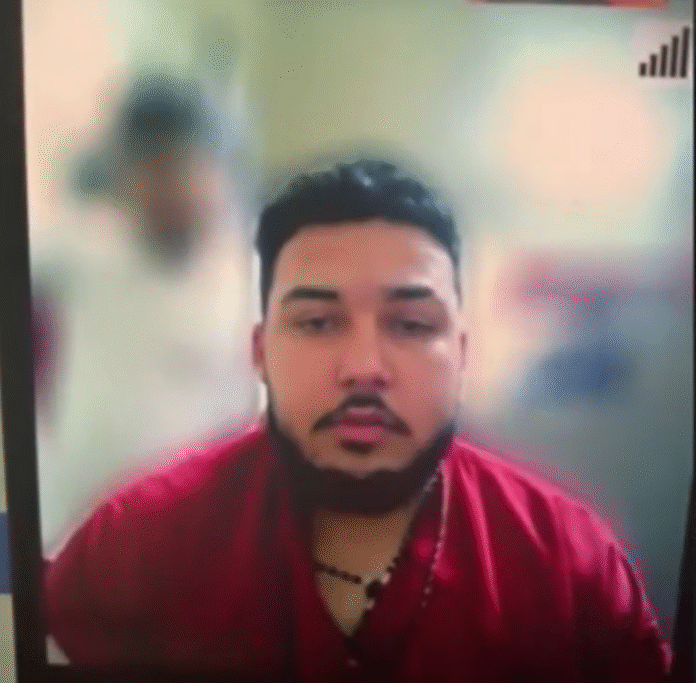
In his return to the White House, President Donald Trump has wasted no time reigniting one of the most polarizing issues of his presidency: immigration. Within his first 100 days, the administration has launched an aggressive campaign to detain and deport undocumented immigrants, drawing both praise from hardline supporters and outrage from civil liberties advocates.
One of the most controversial flashpoints has emerged in the form of a deportation program targeting alleged gang members. Critics argue the operation lacks legal safeguards and due process, while supporters claim it is a necessary step in restoring law and order at the southern border.
The Case of Alessandro Paredes: A Symbol of a Larger Battle
At the center of this unfolding legal and human rights debate is 19-year-old Venezuelan migrant Alessandro Paredes. Detained in North Texas, Paredes had voluntarily turned himself in to authorities in South Carolina after allegedly pointing a weapon at someone. But before the charges could be processed in court, immigration agents took him into custody, labeling him a gang member and initiating deportation procedures.
Paredes adamantly denies any gang affiliation. “We’re being forced to sign papers saying we’re part of a gang,” he told ABC News from detention. His voice joins a growing number of migrants and advocates who say the government is fast-tracking deportations without fair hearings or proper evidence.
The Trump administration has refused to comment directly on Paredes’ case, but his situation mirrors that of dozens of Venezuelans recently deported to El Salvador’s CECOT prison—one of Latin America’s most notorious detention facilities.
A temporary Supreme Court ruling has blocked Paredes’ deportation for now, with justices affirming that he and others must be given the right to due process. Still, the fear of deportation without legal recourse looms over thousands in detention.
An Administration on Offense
Paredes’ case is not an isolated incident, but rather emblematic of the Trump administration’s broader crackdown. On inauguration day, Trump signed a series of executive orders that dismantled immigration protections put in place under former President Joe Biden, including humanitarian parole programs. Shortly thereafter, the Department of Homeland Security launched coordinated raids, targeting individuals with suspected ties to gangs.
Perhaps the most legally audacious move came in March, when Trump invoked the 1798 Alien Enemies Act—a centuries-old law that grants the president sweeping powers to deport foreign nationals during perceived invasions. Under this authority, hundreds were deported, often ignoring or defying court orders that had called for the deportation flights to be halted.
Civil liberties groups, including the ACLU, are sounding alarms. “The Trump administration has not only pushed up to the legal line, but gone well past it,” said ACLU attorney Lee Gelernt. “These actions disregard laws passed by Congress and undermine the Constitution.”
A Divided Nation
Supporters of the president, however, argue that the results speak for themselves. Illegal border crossings, which had surged to record levels under Biden, have now plummeted. Advocates point to the sharp decline as proof that Trump’s uncompromising stance is working.
“President Trump has turned the tide at our southern border,” said Julie Kirschner, head of the Federation for American Immigration Reform (FAIR). “He’s shown the world that entering the U.S. illegally carries real consequences.”
Still, even within conservative circles, questions are being raised about the cost of those consequences—particularly when people with no proven criminal records are being swept up in the raids and detained indefinitely.
An ABC News poll revealed the public is deeply split. While 46% of respondents approve of Trump’s immigration policies, 53% disapprove. The administration’s tactics have created a constitutional standoff in some instances, especially where federal courts have issued rulings the administration has seemingly ignored or sidestepped.
Executive Power Under Scrutiny
Trump’s immigration strategy has relied heavily on executive authority—orders and directives that do not require congressional approval. This makes the policies relatively easy to reverse under a future administration. Yet, in the meantime, those orders are reshaping the lives of thousands.
Legal scholars warn that the defiance of court orders could precipitate a constitutional crisis. “If the executive branch refuses to honor rulings from the judicial branch, we are entering very dangerous territory for American democracy,” said one constitutional law expert.
For immigrants caught in the middle, such as Alessandro Paredes, the uncertainty is overwhelming. They face detention, possible deportation, and in some cases, extradition to countries with which they have no connection or citizenship.
“We’re just asking for justice,” Paredes said. “We’re human. We have rights. We don’t belong in a prison in El Salvador. We just want the chance to be heard and go back to our lives.”
The Road Ahead
As lawsuits mount and public debate intensifies, the future of Trump’s immigration crackdown remains in flux. The courts will likely play a central role in determining how far executive power can reach—and how much protection non-citizens are afforded under U.S. law.
For now, the president’s supporters are hailing the results, while opponents are rallying behind stories like Paredes’ as evidence of overreach and injustice. One thing is clear: the immigration debate has returned to the forefront of American politics, and its resolution may shape the country’s identity for years to come.


